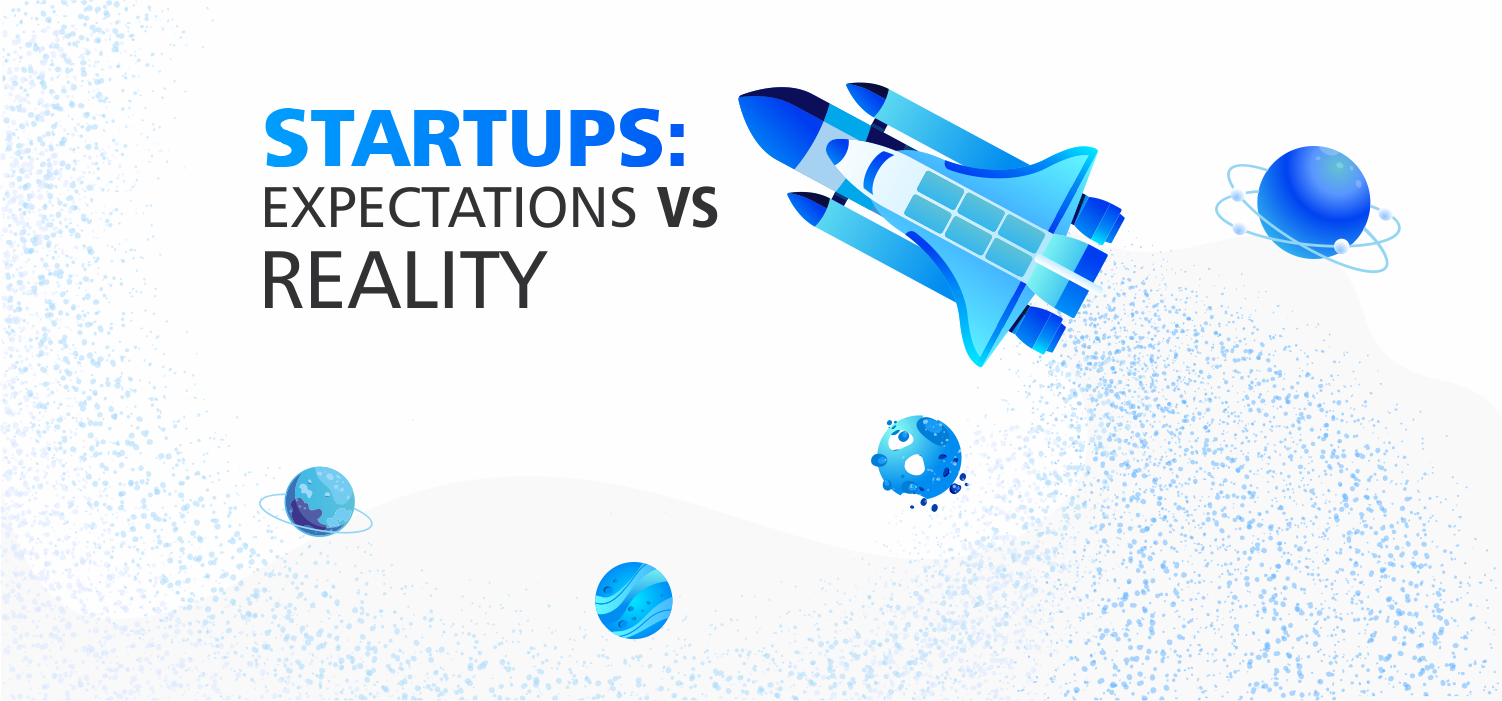Having the idea to build the next big brand is wonderful, isn’t it? What could possibly go wrong? Nevertheless, the more you become involved with the step-by-step process, the more you realize that expectations might be far from reality. To save tons of time and money we suggest comparing the most common expectations that every new entrepreneur experiences during his/her first startup development. Our team suggests what should be done to avoid negative consequences in reality. So, let’s begin!
Idea
Expectation: Quite often product owner thinks that his/her idea is a unique one and there will be no competition in this market niche. That is why it is quite a temptation to neglect market research as well as to think through the detailed specification of the new product.
Reality: In reality, having a great idea is perfect but without thoughtful planning, detailed specification and solid research there would be impossible to develop a top-notch product. In addition, there is a high chance that a similar idea has already been realized by another entrepreneur. In that case, market research aims to reveal the market situation, the main competitors, their weaknesses and strengths. If you are thinking to hire an agency or a freelancer to help you implement your project plans, we suggest undertaking a discovery phase. Despite the fact, the discovery process helps to manage time, energy and budget while creating a high-quality product, it has a few more benefits, such as setting the right goals, revealing user needs and much more.
Read our article "The Role of the Discovery Phase in Product Development".
The Scope of Work
Expectation: You may think: "I just need to start - the rest will fall into place". If you want to run a successful business, then you need to be willing to bite the bullet and take risks at times. Giving up a stable job for a life of struggling to make your company a success isn’t for the faint-hearted. However, jumping into the deep end of the business pool before you’ve learned to swim isn’t a good idea either.
Reality: In fact, everyone needs a plan. Although, you don’t need to know everything about what may happen to your business from day one, you should have a basic plan in mind. Before you do anything, structure a strategy that guides you through what you’re going to do to develop your company, market yourself, and pave the way for growth. You might even want to put a plan in place for what you’re going to do if you eventually decide to sell your venture. The better your plan is, the easier it will be to track your progress and keep yourself focused when you start developing your own company. Confusion and lack of direction have been the death of many a startup. – often within the first 2 years.

Marketing Strategy
Expectations: When you’ve got an exciting new product to share with the world, it’s easy to assume that everyone will start talking about it immediately. With something so amazing to offer, you could tell yourself that you don’t have to worry about a promotion at all. After all, there’s nothing more powerful than word of mouth marketing, right?
Reality: In reality, marketing needs a strategy. Word of mouth marketing is fantastic – but every fire needs a spark to get it started. That means that you need to figure out how you’re going to encourage people to start talking about your business, products, and services from day one. How are you going to launch your website? Do you have a plan for building excitement and anticipation around your upcoming product? What are you going to do to keep the buzz around your business going? Will you have a referral strategy to draw in new customers, or a way of gathering customer testimonials?
Team
Expectation: As a solo entrepreneur you may think: “I can handle everything by myself”. It is quite tempting to put yourself in different roles to transform your idea in reality and take all the credit afterward. Moreover, right now your company is only a small one, so there’s surely not that much you need to do to keep it running well.
Reality: Taking the DIY approach to building a business is not an option if you’re eager to build a reliable product and develop into a trustworthy brand. For sure, there will be parts of running a company that you thrive in. For example, you might be great at motivating employees or organizing processes or as a business owner you are a prodigy in creating new product ideas. Nevertheless, you might not be quite as good at social media marketing or managing the software development issues at the stage of product development. Note, that your product needs a back end and front end developers as well as UI/UX designer if you want to produce a scalable and user-friendly web or mobile app. The specialists would assist you in choosing the right tech stack and develop the product on time and on budget.
Being a jack of all trades and a good entrepreneur is rarely the same thing. The more you heap onto your plate as a business owner, the more you’re going to divide your attention until both your accuracy and results begin to suffer. Play to your strengths and find other people to supplement your weakness.
MVP scope
Expectation: After framing the startup idea, the product owner can jump into the development process. What else to do? At this stage, a lot of entrepreneurs think that the sooner the product will be produced, the sooner he/she will get profit.
Reality: You should focus on building the MVP first. Make your MVP as simple as possible and indicate only really necessary functions and several killer-features. This move will bring the attention of the public and make your product viral. It will show the strengths and weaknesses of the new project and subsequently will shape your future actions. So, weaknesses will be improved and strengths will become the core feature that will show that you are on the right way!
Conclusion
It is quite easy to follow the common expectations about building a small business, however, the reality is what you need to take into account.
Before jumping into the development process you need to validate your startup idea and undertake market research. Later it will help you to frame the right marketing strategy, which should be implemented at the early stage of product development. The scope of work will require your full dedication and careful planning, so don't expect that all you need to do is just start - the rest will fall into place. Additionally, don't think that you will be able to build a high-quality product all by yourself. While you may be good at project management, still you need to have experienced devs and designers by your side. And last but not least, do not neglect the stage of MVP. Focusing on MVP will provide huge benefits for your product.
We hope that the article will be helpful to you. In case you still have any questions or suggestions feel free to contact us and we gladly assist you in any inquiries.





